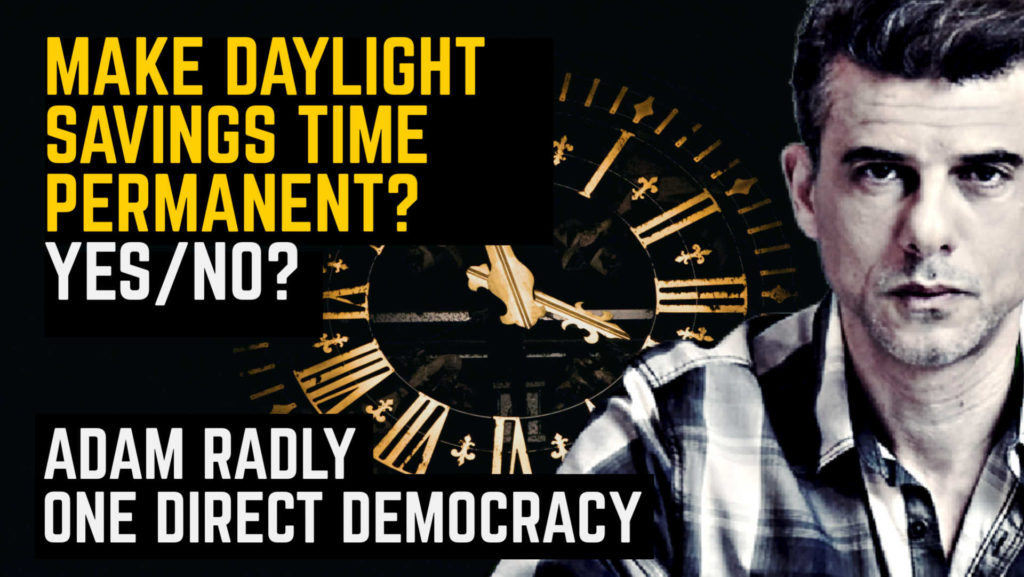Make Daylight Savings Time Permanent? Yes/No?
The US Senate voted to make daylight savings permanent. What do people think about changing the time twice every year? And, if we’re going to stop doing it, should we choose standard time or daylight savings time? What do sleep scientists have to say about all of this?
If you could vote directly on this policy, would you vote for it or against it?
What does the Bill propose to do?
According to this article from Fortune:
“The U.S. Senate voted unanimously to make daylight saving time permanent from 2023.”
One of the first questions that come to mind is – what do sleep scientists have to say about it?
“…sleep scientists argue the choice of daylight saving time over standard time—in other words, choosing the “spring forward” rather than “fall back” time—would leave Americans permanently out of sync with their natural schedule and potentially lead to a range of health issues.”
Okay, so we already have a problem. But, before we get into more detail about that issue, why do we have daylight savings time?
“Originally, daylight saving was meant to reduce energy consumption, by setting clocks forward thus extending the hours of daylight further into the evening. With more sunlight, people require less electricity for artificial lighting. “
So, that was the theory at the time. What does the research tell us about the theory was correct?
“In fact, one 2008 study found that moving clocks forward actually increased electricity consumption as people started using more power-hungry appliances, like air-conditioning, later into the evening.”
The sun obviously rises and falls at different times based on location, so what impact does geographic location have on daylight savings time?
“The U.S. population has also trended south in recent decades, with population growth in states like Arizona, Texas, and Florida significantly outstripping their Northern counterparts. Southern states see a smaller seasonal difference in daylight hours, which reduces the need to “save” daylight. For example, northern Detroit gets over 15 hours of sunlight in the summer and only nine hours in winter. Southernly Austin gets 14 hours of daylight in summer and 10 hours in winter.”
Are there other reasons for not changing the time that are based on science and research?
“Some researchers blame the switch between standard and daylight saving time for a number of social ills, including lost productivity and increased health stress, as people’s bodies adjust to the time change.”
One study found a small but significant increase in road accidents on the Monday after the switch to summertime, as the lost hour of sleep affected people’s driving ability. Other studies found the rate of workplace injuries and even heart attacks tend to increase shortly after the U.S. “springs forward.”
What about business. Does daylight savings time impact consumer behavior?
“Retailers also support a switch to permanent daylight saving time. A 2017 report from JPMorgan Chase found that shoppers spent 3.5% less in stores in the month immediately following the “fall back” switch to standard time, as earlier sunsets encouraged people to go home rather than shop.”
What do people think about changing the time? The simple question is – do they like or not like it?
“…Americans generally hate changing the time on their clocks. A 2019 poll found that seven in 10 Americans would prefer leaving their clocks alone.”
If the objective here is to stop changing the time, we have to choose between standard time and daylight savings time. So which one is best?
“The Senate chose to keep daylight saving, but that might prove to be the worse of the two choices, with potentially worse health outcomes.”
“Many sleep scientists support standard time over daylight saving, as it more closely aligns with the natural day—and thus our natural body clocks.”
Adopting daylight saving time as standard “leaves us permanently out of sync with the natural environment,” said Joseph Takahashi of the University of South Texas to the New York Times.
So, what are the consequences of sleeping and waking at times that are not natural?
“Scientists are also concerned that forcing people to wake up earlier and fall asleep later than their natural body clocks dictate may worsen sleep deprivation, which is linked to increased rates of obesity, diabetes, dementia, and other health issues.”
“Studies have found that people working night shifts—forced to work at times that are out of sync with their natural sleep schedule—have higher rates of heart disease and cancer than those who work daytime hours.”
Has there been an attempt to do this before and what happened?
“The U.S. tried a permanent switch to daylight saving time in 1974 to save energy during the oil embargo by the Organization of Arab Petroleum Exporting Countries. But after complaints from parents about schools starting in the dark, and a spate of well-publicized road accidents involving children, the U.S. abandoned the practice by October 1974. “
Starting school in the dark definitely sounds weird but is it a real problem?
“Sleep deprivation is already endemic among adolescents due to teenagers having to wake up “early” to go to school. Teenagers have a naturally later sleep cycle than children and adults, which means they should wake up later in the day to stay in sync with their body clocks.”
If we know that parents don’t like their kids starting school in the dark and it’s a real problem based on the science of the body clock of teenagers, what are we doing about it now?
“U.S. Sen. Marco Rubio, who co-sponsored the Protecting Sunshine Act, suggested that schools should start later in response to concerns that students would be going to school in the dark.”
This is my personal opinion on this issue:
People don’t like changing their clocks and adapting to a new sleep schedule.
The entire premise of daylight savings time sounds to me like one of the things that happened in the twentieth century where we were constantly trying to do better than nature.
Now, in 2022, we know that we need to work with nature not against it. I think it’s pretty obvious that changing the time has to stop.
But we still have to decide whether to use standard time or daylight savings time.
We have to use the one that is best aligned with our natural body clock and the science makes it clear that we should be using standard time.
The reality is that we have reached a point in time in our evolution where Representative Democracy no longer serves the will of the people.
That’s why I created One Direct Democracy. It’s a movement for upgrading the global democratic system by taking the power away from politicians and putting it in the hands of the people by using direct democracy.
I’ve created the technology, a framework for direct democracy and a plan for how to make it happen. We don’t have to convince any politicians or powerful people to do anything to make this happen. We have the power to do it on our own. We just have to decide to do it.
Direct Democracy is the purest form of democracy.
Representative Democracy is an outdated blunt instrument.
Links to related content



